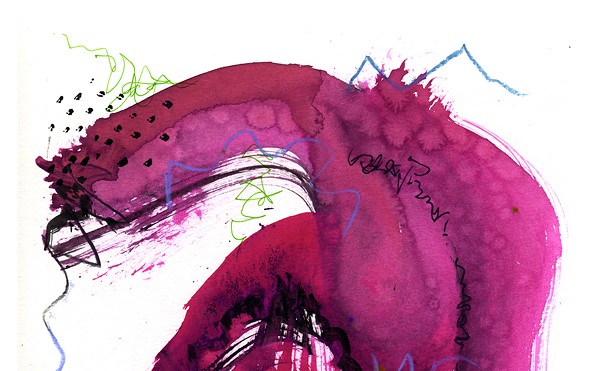How to Feed a Fish
BY ISABELLE WATTENBERG
Find a respectable pet store. Do not agree to take care of your friend’s fish while she’s vacationing in Sydney and realize three years later that you still have it. Before getting the fish, get the tank or bowl, and set it up with rocks and aquatic plants, letting the nitrified bacteria grow in the gravel that costs three seventy-nine a pound. Or forget the gravel and leave the aquatic plants to gasp for sustenance, growing frailty and bitterness because you forgot the only thing they really needed. Go ahead and buy the fish, so that at least one of the entities floating around in the tank is alive. Promise yourself you will not forget to do anything else.
Take four months to get used to the fish. By then, you will automatically greet the fish when you return from work. You will speak to it about deep philosophical matters, you will complain to it about your coworkers, and you will receive a look, in the small beady eye of the creature, that says, I understand—and I want to know more about you. Because you are someone who has ideas, and while I may only be a fish, you can tell me these things, because my gills filter out untruths, and so I will hear what you mean to say regardless of how you say it. But because the fish does not say these things and instead only looks at you, you are never quite sure if it truly feels that way. So sometimes when you come home, you focus solely on the fish and ask how its day went and if the tank is clean enough for it. Regardless of its response, scrub at the walls with an algae pad.
Begin to notice that the fish’s answers are short and disinterested. Ask fewer questions. In time, begin to wonder if the fish really likes you at all. Become more reserved, because you are afraid the fish will mock your feelings. Ignore it for a few days until you feel lonely enough to sit and stare at it a while, even though it swims away. Give it five dollars and some homemade cookies in an attempt to win its affection. Become confused when the fish sometimes accepts its food agreeably, and sometimes sullenly, opening and closing its mouth without really saying anything at all. Become angry; ask yourself why you put up with this when you are sure other fish would recognize your talent and your kindness. Begin to wonder if you really are kind at all.
Buy another fish. This one swims up eagerly, too eagerly. Become disinterested, simply because it likes you so much. Occasionally acknowledge and appreciate its dark orange scales and similar taste in movies, but forget again when your other fish swims up. Wonder why you don’t like this new fish, since it seems to enjoy watching you siphon debris from the tank floor and greets you when you return, bobbing up and down in its pale home. Wonder why, when you arrive home, you always search for the other fish, the fish who rarely emerges from its slimy stone castle. A castle you bought for it, ages ago. Wonder why you didn’t buy a castle for the new fish.
Feed the old fish less. When you do feed it, overturn the carton and let its contents fall out in a large clump as you walk away. You used to be careful, strategically placing flakes about the tank in the hopes that the fish would appear and begin nibbling not out of necessity, but in order to be with you. And when you left the tank, you used to feel a sense of self, having given something to the fish, but received something as well. Now, realize that feeding it takes up time and that the fish rarely seems to care whether or not the small flakes break the surface and dangle below its flat nose. Notice that your words to the fish, void of weight, float away to rest beneath a liverwort plant, and that the fish seems more interested in the ripples formed by the food, chasing them as they broaden and broaden until they break against the side of the tank. Stop looking it in the eye because you are not sure if its eyes are open or closed, their opaque lids a mirage that invites you to talk to thin air. Keep feeding it less until you feed it nothing at all, don’t even glance at the tank as you return home from a day that appears to be getting fuller and fuller, though you are not sure why since you have freed up the time usually spent with the fish. Time not even spent in company with the new fish, who would offer to fill the void, if only you asked. Ignore both fish, though you watch the old one from the corner of the room, wondering what its gills are detecting.
Return home one day to find it belly-up. Break down into sobs because, even though it was only a fish, you knew that a small child could have kept it alive. Wonder why you ended up incapable of keeping the fish alive when, you are pretty sure, you loved it. Concede that perhaps it was the secret nature of your love that let the fish slip away, because you hid your feelings and, perhaps, if you had openly offered your affection, the message might have resonated enough for the fish to hear through the watery walls and agree to stay alive. Know that the pain of the fish’s death is worse for it than for yourself. Secretly ask if this is true. Come to terms not with the death but with the acknowledgement that you chose this ending.





